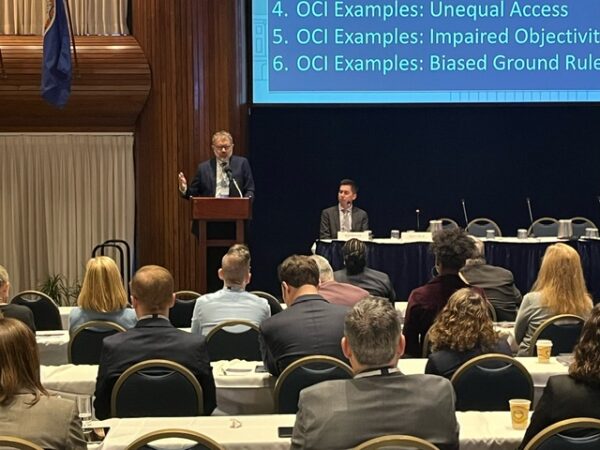The United States Court of Federal Claims (COFC) produced another decision focused on SAM registration and related FAR updates. We previously discussed the changes to the FAR no longer requiring constant SAM registration to be awarded a contract. We have also blogged on a recent COFC decision regarding solicitation amendments based on the new FAR rule. But, what happens if the old FAR rule, such as one regarding SAM registration, is still in a solicitation and the agency does not amend the solicitation?
Continue readingTag Archives: Court of Federal Claims
A Look at the Duty of Good Faith and Fair Dealing (Part III)
For a few weeks now, we have looked at a recent Court of Federal Claims (COFC) decision in two parts regarding the duty of good faith and fair dealing. In the first part, we observed how insistence on the terms of a contract is not a breach of good faith and fair dealing. In the second part, we discussed several separate considerations ranging from a decision to not move a project forward to the next phase to rejection of a claim of a government cabal. Now, we will conclude our look at this decision with the court’s review of the SBIR/STTR policy directive and its impact on the case.
Continue readingA Look at the Duty of Good Faith and Fair Dealing (Part II)
Recently, we looked at part of a Court of Federal Claims (COFC) decision regarding the duty of good faith and fair dealing. In that post, we observed how, unsurprisingly, the government’s insistence that a contractor carry out the express terms of a contract is not strong ground for a claim of breach of the duty of good faith and fair dealing. In this post, we’re going to continue our review of this case (with regards to the duty of good faith and fair dealing) and give more general thoughts on this duty. We’ll finish up with a third post that addresses the biggest issue in this case.
Continue readingA Look at the Duty of Good Faith and Fair Dealing (Part 1)
The duty of good faith and fair dealing in contract law is, admittedly, a bit poorly named. It does not require that a party act in bad faith to breach it. You do not need to act nefariously to run afoul of it. But then the question arises: What is it? How does one breach it? This was (among other things) a question explored in a recent Court of Federal Claims decision regarding an Small Business Innovative Research (SBIR) contract. We will look at that decision’s review of the duty of good faith and fair dealing here in a 2-part series.
Continue readingWhy File: A COFC Protest
As a federal contractor, there are many factors to consider in filing a potential bid protest. In this post, we look at the potential considerations, both pros and cons, for filing a bid protest at the Court of Federal Claims (COFC). Below are some of the main items to think about in considering a bid protest at the COFC, as opposed to a bid protest at the Government Accountability Office (GAO) or an agency level protest. The decision of whether, and where, to file a bid protest is one that should only be taken with care and, preferably, with the advice of counsel.
Continue readingNo Protesting Canceled Contracts, Says COFC
Often contractors will protest an award, then learn that the contract at issue was cancelled by the government due to corrective action. When that occurs, contractors of course feel as if their concerns were not resolved, or the protested other parties were let off the proverbial hook. The U.S. Court of Federal Claims recently explained that if that happens, there is no procurement left to protest, even if there are related research and development projects or actions continuing within the Government.
Continue readingThank You, COFC Judicial Conference
I recently returned from the 35th Annual Judicial Conference for the Court of Federal Claims. I wanted to send a hearty thanks to all of the organizers of the conference, especially Judge Tapp! It was a great opportunity presenting on the topic of Private Conflicts: How the New Private Sector OCI Rules Could Impact Federal Procurement. I also thoroughly enjoyed the other presentations at the conference.
For those looking for more information on this topic, here are some resources for you:
- Original blog post: New OCI Law Focuses on Private Sector Contracts, More Examples, More Procedures
- Contracting While Impaired: Court Rejects Overbroad Finding of OCI Based on Impaired Objectivity
- Apparent Conflict: Appearance of Impropriety Enough to Exclude a Contractor from Federal Contract
- 2024 Blog Post: Predictions: Upcoming Rules on Conflicts of Interest

